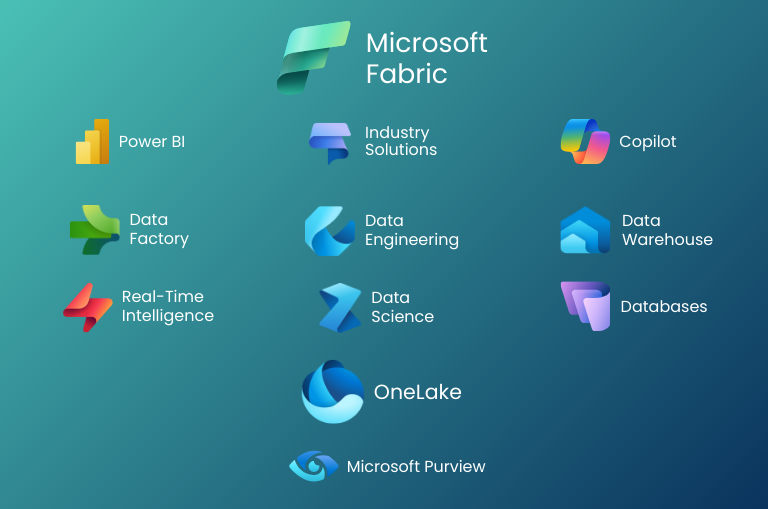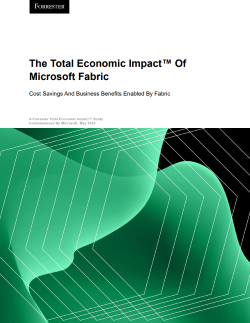What is Industry Solutions in Microsoft Fabric
In response to the unique challenges of various sectors, Microsoft has developed specialised industry solutions. These dedicated tools help companies optimise operations, integrate data from different sources, and leverage advanced analytics to make better business decisions.
Microsoft Fabric is a comprehensive analytics platform for enterprises that combines in one place data movement, processing, transformation, and report creation. The platform merges previously separate components into a consistent ecosystem, centralises data storage with OneLake, and integrates artificial intelligence capabilities, eliminating the need for manual integration.
Industry solutions in Microsoft Fabric provide a platform tailored to the specific needs of sectors such as manufacturing, retail, healthcare, or sustainability. They enable the unification, enrichment, and modelling of industry data, which accelerates the generation of valuable insights and increases organisational productivity.
What is Microsoft Fabric?
Microsoft Fabric is a comprehensive, integrated data and analytics platform created for enterprises seeking a simple yet versatile solution for collecting, processing, and analysing information. The platform operates in a SaaS (Software as a Service) model, ensuring ease of use, high scalability, and security.
The key assumption of the platform is the unification of resources and services in one consistent environment. Instead of integrating solutions from different vendors, Microsoft Fabric offers a unified technology stack based on Microsoft Azure cloud, streamlining work for both business teams and IT specialists.
Data in Microsoft Fabric is stored in OneLake, a central repository that eliminates the need to use many often scattered data stores. Thanks to this, companies can manage access more effectively, maintain data consistency, and ensure compliance with regulations.
Built-in artificial intelligence (AI) mechanisms help better understand data and use it in Microsoft Azure AI Services and specific applications, from real-time reporting to advanced machine learning modelling available in Microsoft Azure AI Foundry.
One of the most innovative elements of the platform is Microsoft 365 Copilot, an integral part of Fabric. Copilot is a generative artificial intelligence (GenAI) assistant that automates routine tasks, fills gaps in expertise, and suggests optimal data operations. As a result, users can more quickly create reports, formulate queries, and implement data engineering processes without writing complex scripts.
Moreover, Copilot analyses the data context and tailors suggestions to specific business needs. Consequently, organisations using Microsoft Fabric supported by Microsoft Copilot gain an integrated environment for efficiently connecting data from diverse sources such as Microsoft Dynamics 365 Sales, designing advanced analytical pipelines, and leveraging machine learning algorithms, as well as ready large (LLM) and small (SLM) models in daily work.
This consistent platform significantly reduces administrative costs, accelerates the deployment of new projects in Power Platform and Microsoft Copilot Studio, and effectively supports teams at every level in maximising the potential of information.
What applications are included in Microsoft Fabric?
Microsoft Fabric is a suite of services with broad application across the entire data processing and analytics cycle. It offers a unified platform where each component plays a key role in the ecosystem.

Thanks to this, companies gain versatile tools for migrating, managing, and analysing data, as well as for creating innovative AI solutions.
- Fabric Data Factory - This is a modern tool for integrating and preparing data from various sources. It allows the automation of ETL/ELT processes, task scheduling, and fast transfer of even gigantic volumes of information to target data warehouses. In addition to a rich library of connectors, Data Factory provides mechanisms functional in AI transformation, such as built-in support for intelligent data flows. Thanks to its simple interface, both experienced programmers and business specialists can quickly create data pipelines without the need to write complicated scripts.
- Fabric Data Engineering - A module created for teams specialising in advanced calculations and data engineering. It offers a Spark cluster-based environment, enabling fast processing of massive datasets and integration with other Fabric components. This fosters the creation of scalable machine learning projects, supported by configurable tools and libraries.
- Fabric Data Warehouse - A high-performance data warehouse designed with scalability and flexibility in mind. It allows the separation of computing resources from storage, enabling users to manage performance and costs independently. It supports the native Delta Lake format and integrates seamlessly with other services.
- Fabric Databases - Facilitate the management of relational and custom data structures in a centralised environment. They allow quick replication of data from various sources and consistent scaling for transactional and analytical applications.
- Fabric Data Science - A module that simplifies the design, training, and deployment of machine learning models. It supports integration with Azure Machine Learning and provides a set of tools that facilitate experiments and model lifecycle management.
- Fabric Real-time Intelligence - Provides instant collection and processing of streaming data, enabling real-time event monitoring and log analysis. This allows companies to respond quickly to dynamically changing business conditions based on current data.
- Fabric Power BI - A well-known and valued tool for visualisation and interactive data analysis. In the Fabric environment, it provides easy access to all resources in OneLake, speeding up the creation of reports and dashboards.
- Copilot in Fabric - Copilot is an AI assistant that supports users in automating tasks related to data transformation, cleaning, and modelling. Its ability to generate suggestions and code significantly accelerates the implementation of new analytical processes and learning how to use the platform.
- Fabric OneLake - A central data repository where all files and tables are collected. Thanks to consistent storage, information can be easily shared across different Fabric modules, and data duplication can be avoided.
- Microsoft Purview - A comprehensive solution for data governance and security. It allows monitoring the flow of information within Fabric and establishing governance and compliance policies.
- Fabric Industry Solutions - Provides dedicated industry-specific data solutions that form a solid foundation for data management, analysis, and key decision-making. These solutions address the specific challenges of different sectors, enabling companies to optimise processes, combine data from many sources, and use advanced analytical tools.
Microsoft Fabric brings all these areas together in a unified data platform, offering the most versatile platform for analysing large datasets across the industry. Fabric enables organisations and individuals to transform large and complex data repositories into practical working solutions and business insights.
Manufacturing data solutions – Data management solutions for manufacturing in Microsoft Fabric
In today’s manufacturing landscape, harnessing the full power of data is essential for driving innovation, increasing operational efficiency, and making informed decisions. Manufacturing data management solutions in Microsoft Fabric are at the heart of these efforts.
Manufacturers face numerous challenges that hinder their progress toward industrial transformation. These include:
- The need to increase Overall Equipment Effectiveness (OEE) and minimise operational costs is crucial.
- Difficulties in scaling digital factory solutions.
- Problems with leveraging legacy infrastructures.
- Workforce shortages and an ageing workforce.
- Rising labour and compliance costs.
Manufacturing is one of the most data-intensive sectors, generating massive amounts of information from sensors, machines, enterprise systems, and human interactions. However, most of this data remains siloed, unstructured, and unused, limiting the potential for analytics and innovation.
Manufacturing data management solutions in Microsoft Fabric offer a comprehensive framework for data integration and analytics, enabling manufacturers to capture and organise diverse data from MES systems, machines, sensors, and various applications.
Key capabilities of these solutions include the ISA95 (IEC 62264) compliant manufacturing data model, Microsoft connectors to Azure IoT Operations and Fabric OneLake, and partner connectors. These solutions help manufacturers unify their OT and IT data environments and accelerate data transformation for AI, enabling the creation of their own copilots for frontline workers.
Retail data solutions – Retail data solutions in Microsoft Fabric
Data plays a crucial role in improving operational efficiency, making data-driven decisions, and increasing customer satisfaction in the retail sector. Retailers can analyse their data to improve inventory optimisation, customer segmentation, sales forecasting, dynamic pricing, and fraud detection.
However, the retail industry faces many challenges:
- Managing massive amounts of data and being able to analyse it for business decisions.
- Dealing with application silos from different vendors, which hinders analysis and cross-application workflows.
- Achieving real-time responsiveness to quickly address customer needs.
- Making decisions without data reliance leads to lower customer satisfaction and poor business management.
Retail data solutions in Microsoft Fabric are industry-specific solutions that help unify, enrich, and model industry data and generate insights faster. With them, retailers can leverage the flexibility of Fabric to address their challenges and harness opportunities.
These solutions enable retailers to:
- Improve financial results by increasing operational efficiency.
- Standardise and harmonise their data environment within an industry data model template.
- Capture data from diverse applications using ready-made connectors.
- Generate valuable, actionable insights from data available in the standard industry data model.
Key capabilities include the retail data model, Sitecore OrderCloud connector, “Frequently Bought Together” model, and Personalised Shopping Agent.
Sustainability data solutions – Sustainability data solutions in Microsoft Fabric
Sustainability disclosures, analytics, and emission reductions require rich environmental, social, and governance (ESG) data from different sources that must be unified. Sustainability data solutions in Microsoft Fabric provide unique capabilities to capture, harmonise, and process scattered data for specific sustainability scenarios.
These solutions offer a range of specialised features that support organisations in managing and analysing ESG data:
- ESG Data Environment: Centralizes and transforms scattered data into a single sustainability data lake aligned with a standardized ESG schema.
- Environmental data and insights: Enables building custom insights on carbon, water, and waste emissions by connecting to data in Microsoft Sustainability Manager.
- Environmental, social, and governance metrics: Allows calculation, visualisation, and analysis of ESG metrics for regulatory standards such as the Corporate Sustainability Disclosure Regulation (CSRD).
- Social and governance insights: Enables generating social and governance insights from distributed data in the ESG data lake.
- Microsoft Azure emissions insights: Supports reporting and analysing Microsoft Azure emissions data by capturing and processing it in the ESG data lake.
It is worth noting that the ESG Data Environment function is a prerequisite for all other features, forming the foundation of the entire sustainability data ecosystem.
Healthcare data solutions – Healthcare data solutions in Microsoft Fabric
Healthcare organisations must analyse vast amounts of data to obtain valuable insights. However, this data is often unstructured or semi-structured, making it difficult to access and utilise.
Currently, healthcare organisations face the following challenges:
- Unstructured and inaccessible data: 50% to 90% of data in most healthcare facilities is unstructured and largely inaccessible.
- Limited insight into patient experiences: Difficulty predicting emergencies and optimising treatment.
- Difficulty accessing insights: Healthcare providers spend 60–70% of analysis time retrieving health data.
Healthcare data solutions in Microsoft Fabric help accelerate time-to-value by addressing the need to transform healthcare data into an analysis-ready format efficiently. They enable exploratory analyses, large-scale analytics, and feed generative artificial intelligence with healthcare data.
Using intuitive tools such as data pipelines and transformations, complex datasets can be easily navigated and processed, overcoming challenges associated with unstructured data formats.
The solutions include the following features: healthcare data foundations, cohort discovery and building, multimodal AI insights organisation, data export from Azure Health Data Services, OMOP transformations, DICOM data transformation, and many more.
Key benefits of using industry solutions
Microsoft Fabric is a platform for all data roles. Everyone using data, from analysts and scientists to business users, can do so securely on one comprehensive platform. Data engineers can build data pipelines, analysts can prepare reports in Power BI without separate data preparation, and scientists can create models on the same platform. Asignificantt benefit is the elimination of unnecessary IT and cloud costs. Instead of many tools for each data experiment, Fabric consolidates them into one solution. Third-party applications for security or management are also unnecessary, as Fabric offers built-in options.
The platform provides unified management of data from different sources and powerful analytical tools that enable rapid practical insights. Thanks to scalability, Microsoft Fabric is suitable for organisations of any size.
By using advanced analytics and AI, companies can increase productivity and operational efficiency. Each industry solution includes standard industry-specific data models that accelerate time-to-value.
Industry solutions deliver specialised AI agents, such as the Factory Operations Agent, tailored to each industry’s specific needs. These agents can accelerate problem-solving and increase productivity through natural language queries to the unified data environment.
By unifying, enriching, and modelling industry data, these solutions create high-quality datasets for AI models.Organisationss can leverage AI to automate data analysis, eliminating the need for manual pre-selection of data.
Return on investment of implementing the unified Microsoft Fabric data platform
 The Forrester report The Total Economic Impact™ Of Microsoft Fabric (TEI) shows that Microsoft Fabric provides a 379% return on investment (ROI) over three years with USD 9.79 million NPV. Analysing a company with revenues of USD 5 billion, Fabric increased the productivity of data engineers by 25% (USD 1.8 million savings), increased the efficiency of business analysts by 20% (USD 4.8 million savings), and generated USD 3.6 million in gains thanks to better decisions.
The Forrester report The Total Economic Impact™ Of Microsoft Fabric (TEI) shows that Microsoft Fabric provides a 379% return on investment (ROI) over three years with USD 9.79 million NPV. Analysing a company with revenues of USD 5 billion, Fabric increased the productivity of data engineers by 25% (USD 1.8 million savings), increased the efficiency of business analysts by 20% (USD 4.8 million savings), and generated USD 3.6 million in gains thanks to better decisions.
Infrastructure savings reached USD 779,000, and employee retention improved by 8%. The unified platform integrates data engineering, warehousing, science, and real-time analysis, eliminating silos. The SaaS model and intuitive interface enable data availability across the organisation, supporting data-driven strategies, according to the Forrester TEI study commissioned by Microsoft.
Summary
Fabric Industry Solutions represent a breakthrough in data management and analytics for diverse business sectors. By combining specialised data models, AI integration, Microsoft Copilot, and unified data management, these solutions provide the comprehensive Microsoft Fabric ecosystem that addresses the specific challenges of each industry.
For organisations considering digital transformation, these solutions offer a strategic advantage. They enable easier integration of diverse data sources, elimination of information silos, and democratisation of access to advanced analytics for all employees.
The joint implementation of Microsoft Fabric with Microsoft Power BI and the use of industry data solutions provide a comprehensive and secure analytics environment. The deployment of Microsoft 365 Copilot further supports employees in analysing data and generating reports within the secure Microsoft 365 environment. This combination not only increases efficiency and accelerates data insights but also ensures peace of mind with robust security and compliance mechanisms.
The integration of artificial intelligence and generative AI capabilities in industry solutions places organisations at the forefront of the next wave of innovation. From AI-powered chatbots providing on-demand insights to AI agents helping solve complex industry problems, these tools are revolutionising how businesses operate.

